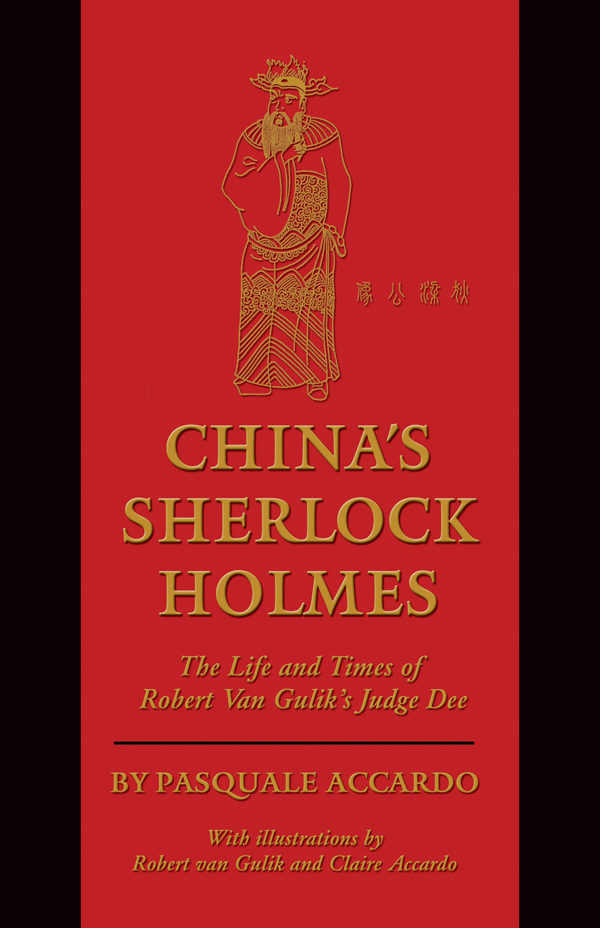


China’s Sherlock Holmes: The Life and Times of Robert van Gulik’s Judge Dee summarizes the career of the real-life seventh-century Chinese magistrate Judge Dee as presented in the fictional detective narratives of sinologist Robert van Gulik. An introductory chapter reviews the social, philosophical, religious, educational, and political background of the illustrious Tang Dynasty in which Dee lived and worked; citations form contemporary sources are placed alongside quotations from van Gulik’s historically accurate Dee narratives. A brief – mostly fictional – biography of Judge Dee is followed by biographical sketches of Dee’s lieutenants as they are all developed throughout the novels. Detailed plot outlines offer an analysis of sources and selected comparisons from the mystery writing tradition. This chapter consists almost entirely of ‘spoilers’ and should be avoided by those who do not wish to have a good mystery ruined by premature disclosure of the murderer. Readers already familiar with the narratives can use these analyses to review the Judge’s successful methods. A discussion of the phenomenon of ‘doubling’ and the use of classic Chinese book illustrations throughout the series concludes the discussion of van Gulik’s work. A map of Dee’s fictional postings and a glossary of names in the Shih Ti are included to further allow the reader a quick overview of the entire series. A limited bibliography is appended for further reading. For readers who have enjoyed most or all of the series, this volume is offered as a review and appreciation; for those who have not read any of the books, it is offered as an invitation to discover this marvellous literary – and scholarly - achievement. Judge Dee continues to be exceedingly popular in contemporary Chinese culture and deserves to be better recognized in the history of modern detective fiction.
Pasquale Accardo, M.D., graduated from SUNY Downstate, served in the USAF, completed his pediatric residency at Riley Children’s Hospital (Indianapolis), and his child development fellowship at the John F. Kennedy Institute (Baltimore). He is specialized in Pediatrics and subspecialized in Neurodevelopmental Disabilities and Developmental and Behavioral Pediatrics. He served as the medical director of the Knights of Columbus Developmental Center (St. Louis University School of Medicine), as LEND director (Westchester Institute for Human Development), and is currently the James H. Franklin Professor of Developmental Research in Pediatrics (Medical College of Virginia) where he directs the CHOR Child Development Clinic. Past appointments include President of the SDP, chairman of the AAP Section on Children with Disabilities, and ABP board member. Dr. Accardo has authored over 200 publications including four dozen books. He has published on Sherlock Holmes, G.K. Chesterton, Gideon Fell, history and literature. In 2005 he received the Arnold J. Capute Award from the AAP Council on Children with Disabilities. He is invested in the Baker Street Irregulars (BSI) as Gorgiano of the Red Circle, and has served on the Board of Directors of the American Chesterton Society.
Robert Hans van Gulik was born in Zutphen in the Netherlands on August 9, 1910, and died in The Hague September 24, 1967. He received his Ph.D. from the University of Leyden in 1934 with a thesis on the Adoration of the Horse in China, Japan, India and Tibet, and in 1935 he entered the Dutch Foreign service with postings in Tokyo, China, Washington, D.C., New Delhi, Kuala Lumpur, and Beirut. An expert linguist and Orientalist (especially Sinologist), van Gulik published scholarly works on the Blackfoot language, the Chinese lute, Ming Dynasty erotic art, Sanskrit, the gibbon, Chinese ink stones, and Chinese sex practices. He himself mastered the classic Chinese lute (guqin). An expert on Imperial Chinese jurisprudence, in 1949 van Gulik translated the Ming Dynasty detective novel Dee Goong An as Celebrated Cases of Judge Dee. When modern mystery writers failed to take up the challenge to continue the experiment, he then produced a further sixteen volumes of Judge Dee novels and short stories, almost always taking the plots from ancient Chinese forensic reports. His westernization of his Chinese originals retained sufficient detail for the novels to be historically accurate depictions of seventh-century Tang China.
Other Books by the Same Author: